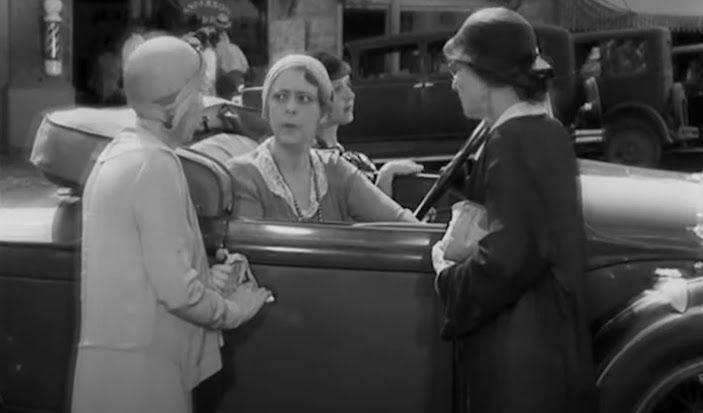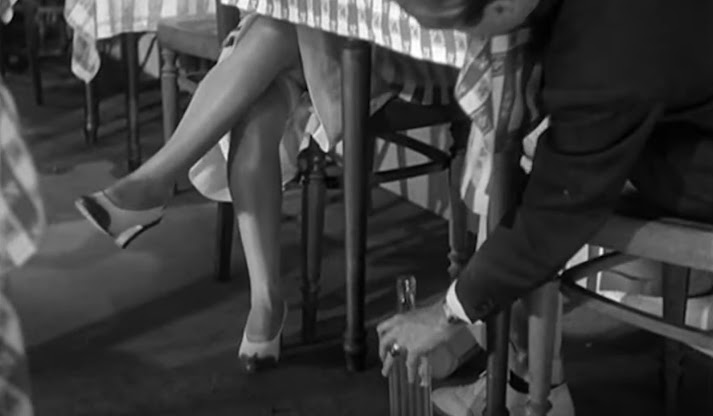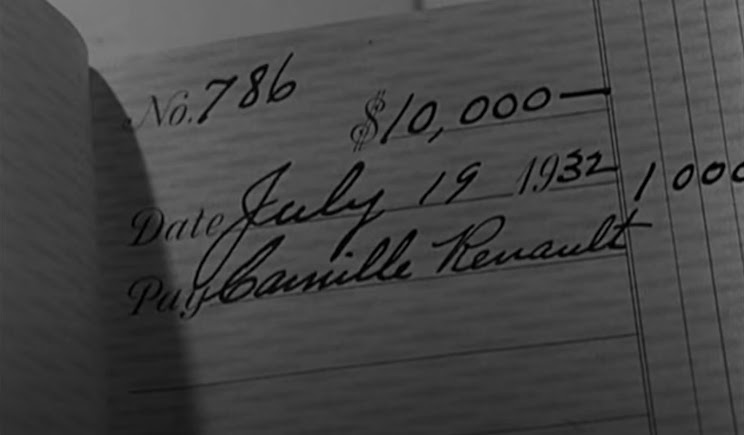Canon Fire #2
Among the One Hundred: Hot Saturday (1932)
Did small towns breed anything other than gossip, misery, more gossip? Resolved by the early thirties was … no they didn’t. It was less to get above one’s raising than to get far away from one’s raising. Everyone starts somewhere, even Podunk places if so cursed, but there’s no excuse for staying there. When did attitudes so turn on rural beginnings, let alone endings? A 1966 history of The Smart Set magazine (teens and twenties-published) touched on what authors called “The Revolt of the Village,” better called Revolt from the Village, or more so, Escape from them. Such attitude came in wake of a past century and subsequent world war, census reflecting increase to fifty-one percent living by 1920 in urban areas (today eighty-one percent and rising, if not risen). There once was a Cult of the Village, midwest Edens of “goodness and heroism,” but gone were those days, said scholar Carl Van Doren, who spoke in ’20 of “provincialism and cultural rot” to characterize rural life. Pastoral traditions were for dismantling as literature and arts moved east and pitched tents in Greenwich Village and spots amenable to intelligentsia fed up with notion that country backgrounds were noblest to spring from. New to me was eight of eleven Pulitzer winners between 1918 and 1929 being of Midwest origin, condition coastal elites were determined to change. They would of course, and how. So when did small towns “rot” into “reactionary backwater” to become “flyover country” as now defined? Hot Saturday shows attitudes hard upon hardening.
 |
| Gossips at Work As in All Damnable Small Towns |
 |
| Sex and Contraband Booze the Pastime in Marysville Just Like Anywhere USA |
Opener screen text amounts to policy statement, Marysville best avoided but by those who forfeit what they enjoy of private life or company of cultivated others. Paramount shot in an actual small town for conviction, one suffocating as circumstance of narrow-mind citizenry. Nancy Carroll’s “Ruth Brock” has a bank position as do others of callow young adulthood whose society she limits herself to because what else is available? To this comes city man “Romer Sheffield” (Cary Grant), a rake and wealthy in the bargain, who keeps summer abode near a lake where youth frolics during time off. Romer has good bootleggers and shares his yield, being alone now that discard mistress “Camille Renault” has been paid off and put aboard a train. Ruth as diamond in the rough attracts Romer, but she is too good a girl to lie down for him. Town talk assumes the contrary however, so her reputation is ruined, this on heels of being let go from the bank job. These are but natural consequence of stifling environment that is Marysville. Should Ruth remain here, she’ll settle finally for one or other of rubes unworthy of her. Parents are neither supportive or encouraging, a father once in politics and now on the bum, her mother a nag who values Ruth only for weekly pay packet the household will attach. There is nothing about Marysville to recommend it, Ruth departing the only chance that she'll end happy. Romer as free agent, if casual fornicator, is clearly preferable, surprising moral to the story Hot Saturday tells, yet an only conclusion 1932 audiences would be expected to embrace.
 |
| What It Was Worth To Dispose of a Mistress in 1932 |
 |
| Edward Woods as Hick "Connie Billip" is Small Competition for Randy Romer Sheffield |
But did they? There was state-imposed censorship, footage lifted off prints that went back incomplete to depots. Hot Saturday was a tale told by ones who for most part disdained those content to stay put in sticks. George Jean Nathan, who I’m sure regarded himself a fair man, characterized American novels (in 1929) as “written by men and women who, for all their pretense to the contrary, are in the matter of mind, life, attitude, and environment essentially and actually country-jakes.” The “yokel grain” was unmistakable, said Nathan, “the more culturally experienced and cosmopolitan reader … alienated … by the author’s unconscious betrayal of himself as cousin at least to the characters he dissects and as a more or less comfortable habitue of the sorry landscape he describes.” To Nathan’s reckoning, American narrative “had straws in its hair and a trace of cow on its boot … written in the main by provincials,” most of them lacking “that silent and hidden yet pervasively articulate metropolitan and world-balanced note that one finds in the novels of even the lesser Europeans.” Part of problem thinkers like Nathan had with movies was perception they “cow”towed to bumpkins same as books not worthy of East Coast reading, and yes, there was straw in hair of those who created or consumed films by Will Rogers, series westerns, “country-jake” done on conveyor by Universal and firms of lesser pedigree. Hot Saturday may have been set in comparative backwoods, but so long as a rose like Ruth could be plucked from Marysville wilting garden, even by perceived cad that was Romer, hope might prevail.
Randolph Scott as “Bill Fadden” is presented as romantic alternative to Romer. Will Ruth choose this hometown boy who always loved her and went off but temporary to learn geological surveying? Bill at least has education but is otherwise enclosed and intolerant as others of his “sorry landscape.” He will lose Ruth for electing to believe nasty gossip and showing Marysville stripe. What can she do but confirm his suspicion by bedding down with Romer? Current viewers cheer this turn, being unexpected and true to precode ethos, but notice it serves more the ingrained disdain on the part of an increasingly empowered elite. For them, whatever Bill got, he had coming, his contrition too late to undo damage done for endorsing Marysville or any aspect of its value system. By leaving home to face an uncertain future, Ruth turns scorn received from townsfolk back upon them, her decision presented as not just a right one, but an only acceptable one. Riding away with Romer, “to New York” he says, Ruth gets all the berries when Romer springs a proposal, telling her a minister friend “will marry us,” them plus writers, and us, knowing that bad as Marysville was, certain conventions it clung to must be observed.







7 Comments:
So happy to see you spotlighting this terrific - and still undercelebrated - film. 1932 was a great year for movies (Blonde Venus, The Big Broadcast, Union Depot, Jewel Robbery, Rain, The Mummy, Downstairs, Freaks, Night After Night, This is the Night, The Bartered Bride, Union Depot, Love is a Racket ... lots more). But ever since I first saw it, "Hot Saturday"'s remained my absolute 1932 favorite. And the all-time best showcase for the marvelous talents of Nancy Carroll.
She was among the group of early 30's actresses (I'd also include Sylvia Sidney and Wynne Gibson; early 30's Loretta Young probably belongs in this group too) whose immense talents, beautifully distinctive voices and personalities still radiate an almost irresistible appeal. At least for those lucky enough to see the work that deservedly made them pre-Code depression era favorites.
So......where can one see this masterpiece?
My little hometown is in the middle of (mostly) red state Pennsylvania; hence my calling it
"Dead Center," for two reasons.
"This masterpiece" is readily available from Kino on Blu-Ray, and from Universal on DVD.
For some reason my mind goes to the MGM version of "Madame Bovary". The film begins with James Mason in a courtroom, defending the book for presenting something we should be outraged about. We then get the story of a girl whose mind is poisoned by wicked romantic novels ... who marries to escape wicked farm life ... who endures wicked middle-class village life ... who pursues wicked aristocratic life ... and who's unsympathetic herself, her fate emphatically self-inflicted. There's no option of honesty and goodness, even if she wanted one. In the end we're left to feel contempt for everything and everybody, with only incidental pity allowed for Bovary's husband and daughter.
As you note, small town virtue was kept alive in the movies by the need to service all those neighborhood houses. It also made a comeback with WWII and the Cold War, idealized values best sold in folksy settings. There came a point where the fantasy of Andy Hardy's hometown morphed into the fantasy of the suburbs: quasi-rural with neither the dirt of agriculture nor the grime of industry ... nor the people involved in same, except for the occasional object of charity or suspicion.
Thank you, John.
Mr. DB -- The success of this weekend's surprise hit (A MAN CALLED OTTO; $15 million instead of the predicted $10 million) has been almost totally in non-urban theaters.
I grew up in a small town. Big cities are just collections of small towns. Many seem to want the anonymity big cities can provide. I'm not one for that. You've done it again. You took a picture I had never heard or thought of and made it into one I want to say. Gossip does not rely on small towns. Big city gossip still rages about whether or not Grant and Scott were more than housemates. The only people who care about other people's lives are those that don't have one themselves. There are a lot of those folks.
In feudal times in Europe (which really wasn't all that long before 1932 in some parts of Europe), people living behind the gates and walls of the "free cities" enjoyed far greater personal liberty as to how to live their lives than those who found themselves living on the "country estates", each with its own village, and both ruled over by the "lord of the manor" or some such local district chief.
Habits of life and of thinking about things often continue in people and societies despite the changes in legal forms which may occur; perhaps the makers of this film somehow mistook American rural/village life as being similar to European rural/village life as it was still seen to be in the less advanced parts of Europe.
I say this, because "small town life" in North America as it is actually lived today can feel much "freer" than life does in North American cities; perhaps some found it so back then too, and the makers of this film simply didn't notice those people.
Meanwhile I'm happy to find that I have actually a dvd of this film in the bin, so it's now in my viewing queue; I might have more to say after I actually watch it.
Post a Comment
<< Home